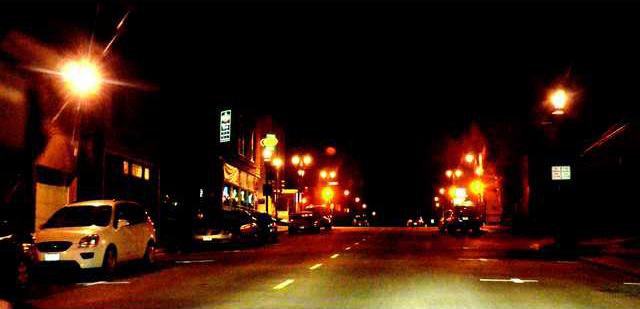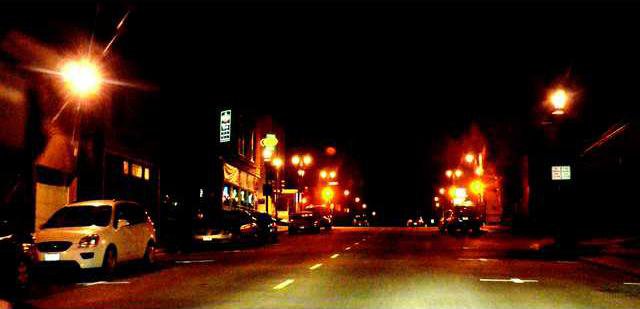The fact that you’re sleeping at night doesn’t mean Platteville is sleeping.
Restaurants and bars are hubs of activity. People drive through Platteville on the way to other destinations. College students celebrate surviving another week of classes.
To keep late-night activity from getting out of hand, Platteville police work all night, sometimes accompanied by Platteville firefighters and EMS EMTs.
This particular Friday night, police Sgt. Josh Grabandt is the shift commander, and Officers T.J. Sheffer, Ryan Knoerschild and Amy Hartwig are on patrol. Sheffer works 4 p.m. to 4 a.m., and Grabandt, Knoerschild and Hartwig work 7 p.m. to 7 a.m.
“You work, you go home and you sleep, you eat, and you work,” said Grabandt. “It gives you a lot more time off, and when you’re plugged into work, you’re really plugged in.
“I like the work; it’s just tough when you have kids. When they get up Daddy’s going to bed.”
Two dispatchers work this night shift — Laura Brown until 11 p.m., and Amy Dillman from 11 until 7 a.m.
“I like communication; that’s always been my niche,” said Dillman, who has worked for the city for 7½ years and as a dispatcher for 23 years.
This Friday night wasn’t an especially busy weekend night. Part of the reason may have been the cold, part may have been UW–Platteville’s Parents Weekend, and part may be Freakfest in Madison.
Grabandt estimates how busy the night will be by the number of cars and pedestrian traffic he sees. “Divide by temperature, and come up with some sort of equation,” he joked.
Elsewhere, UW–Platteville police patrol the UWP campus. The Grant County Sheriff’s Department has deputies out as well.
“The nice thing about working in a city is that you have backup,” said Grabandt. “In the county your backup can be nonexistent” due to the county’s size, larger than the state of Rhode Island.
9:40 p.m.: Dispatcher Laura Brown gets a call about a man chasing another man on Main Street. Grabandt goes out to look, but by the time he gets to the scene, the alleged chaser and chased are both gone.
The police’s focus includes “quality of life crimes, and that’s what we’re looking to target” this night, said Grabandt.
11 p.m.: Grabandt stops a car for having expired registration. What also was expired was the driver’s license.
“It’s 11 at night; we’re looking for impaired drivers and warrants and so on,” he said.
The driver was neither impaired nor had outstanding warrants. She was given a warning and told to update her license and registration.
11:10 p.m.: A loud music complaint is called in on Pine Street. After some brief confusion over whether the address is on East Pine or West Pine, Grabandt, Knoerschild and Hartwig find the house on East Pine. The bass can be heard clearly from the outside.
“Any idea why we’re here?”
“Probably noise” is the answer.
The man who answers the door is informed he’s getting a ticket. “Not even a warning?” he asks.
He’s told that the city has a “zero-tolerance” policy on noise complaints. He is getting a disorderly conduct — excessive noise citation mailed to him.
“Really? We were cooperating so nice,” he says.
“That’s the procedure we have to take,” says Grabandt. “We wouldn’t be there if we hadn’t had a call.”
“If you’ve had [police] coming here before you’re obviously not understanding,” says Hartwig.
11:20 p.m.: The visit ends quickly because of a call for a fire at Jenor Towers. The Fire Department is also dispatched.
Numerous residents, some with their pets, are standing in the lobby or outside. A piercing fire alarm cuts through the air better than the lights do due to the smoke extending the length of the hallway to the source of the smoke.
The smoke is from burned popcorn in a microwave oven in an apartment. The residents of the apartment claim they had been microwaving the popcorn only one minute before it started smoking.
Two fire trucks equipped with fans arrive. None of the residents were injured. The officers predict they’ll smell like burned popcorn all night.
11:37 p.m.: Police are called to a fight on West Cedar Street between two women. Knoerschild returns 15 minutes later with a woman who will receive a disorderly conduct ticket.
The woman sits in the booking area, staring straight ahead, saying nothing until Knoerschild asks identification questions. Her mug shot is taken with a digital camera, and she is fingerprinted the old-fashioned way, inked fingers rolled onto paper.
“You’re lucky you didn’t drive,” Knoerschild tells the woman. “You didn’t need to lie to us either.”
Grabandt estimates the woman has a blood alcohol level of 0.15 to 0.2. Legal intoxication in Wisconsin is 0.08.
Knoerschild gives her a ride back to her house. The police department keeps her car keys.
12:30 p.m.: Knoerschild returns to patrol. He’s been with the police department for four years, three of those working nights. He describes nights as “busy … different kind of work.”
12:44 p.m.: Knoerschild, Hartwig and Grabandt go to their second noise complaint of the night, this time on Southwest Road. When a man is given a ticket for disorderly conduct — noise, he says, “I highly doubt that,” to which Grabandt replies, “Well, you can take it to court then.”
12:50 a.m.: Knoerschild sees a jogger dressed head to toe in black, including a face covering, topped by a red hat. He sees the jogger most nights, sprinting more than jogging throughout downtown, including Second Street.
1 a.m.: Knoerschild drives through Second Street, which has about 100 people, some costumed, walking up and down the sidewalk. One man is dressed in police tactical gear, including a badge around a neck holder, although his pistol is blaze orange. Another wears an eastern Wisconsin fire department T-shirt, turnout pants and firefighter hat. Many women are dressed for much warmer weather than this evening.
1:25 a.m.: Knoerschild sees someone outside a bar with an open bottle of beer. He walks over, tells him to pour the beer into the street, then checks his ID and prepares to write him a citation for open intoxicants. Five minutes later, though, another man comes over and tells Knoerschild he had asked his friend to hold his beer while he found a bathroom. He gets the open-intoxicants ticket instead.
1:40 a.m.: Knoerschild and Sheffer stand on Second Street as bar time approaches. They talk to people; Sheffer strikes up a motorcycle conversation with one of the owners of the three motorcycles parked in front of Schoolgirlz.
2:10 a.m.: A driver on Second Street tells Knoerschild and Sheffer about someone asleep, or passed out, north of them. Knoerschild and Sheffer walk north on Second to find a man lying behind a car parked on Second Street. He appears to be something more than merely asleep.
2:20 a.m.: Knoerschild calls for an ambulance.
2:30 a.m.: A Platteville ambulance, with no lights or siren, pulls up to the scene, just as the bars to the south close.
Knoershild finds a friend of the man who tries, but fails, to get hold of someone else to take the man. After several minutes of conversation and attempted phone calls, the decision is made to take the man to Southwest Health Center.
Walking back to his squad car, Knoerschild finds the man they’d been seeking, and he agrees to go to the hospital.
2:50 a.m.: The man lays on a bed in the Southwest Health Center emergency room. The “responsible party” and two other people meet with a nurse as Knoerschild walks out the door.
“At least he saved himself $2,000,” says Knoerschild, explaining that going to a detox unit — Madison for men, Winnebago County for women — costs $2,000. It also costs the officer who takes someone to detox five to seven hours round-trip.
3:10 a.m.: Knoerschild lets his visitor out at the Police Department. Second Street is now quiet. So is the rest of Platteville, lit by streetlights, the headlights of cars and trucks, and the full moon.





